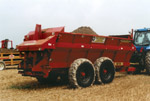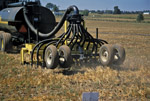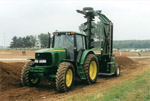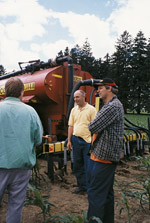
Anyone who handles, applies or transports manure and/or fertilizer in
Indiana will soon have to get a permit under a new Fertilizer
Certification Program currently in development.
 |
 |
 |
 |
Certification program being developed in Indiana
Anyone who handles, applies or transports manure and/or fertilizer in Indiana will soon have to get a permit under a new Fertilizer Certification Program currently in development. According to information shared with farmers during the Mid America Ag Show, held in early February in Indianapolis, anyone who buys, hauls and applies crop nutrients in the state will have to receive educational training and be certified. The program, which is expected to be phased in within the next two years, will apply to all large confined animal feeding operations (CAFOs) plus farmers and custom applicators that apply manure to more than 100 acres of land per year. The program will be handled by Indiana’s State Chemist office and will operate similar to the state’s Chemical Applicators Certification program.
New director at the Cornell Waste Management Institute
Professor Murray McBride has become the director and Jean Bonhotal the associate director of the Cornell Waste Management Institute at Cornell University in New York state.
Both changes were effective January 1, 2008 in response to the phased retirement of past CWMI director, Ellen Harrison. Other CWMI staff members – Lauri Wellin and Mary Schwarz – will continue in their current positions.
Harrison will continue working part-time for a couple of months to finish up several projects. Her official retirement occurs this spring. “I have been very fortunate to be a part of CWMI since its creation in 1987 and I have tremendous confidence in its future,” says Harrison. “I have thoroughly enjoyed these 20-plus years. Although I know I will miss CWMI and my wonderful colleagues at Cornell and throughout the world, I am looking forward to the next chapter.”
McBride has worked closely with CWMI for many years and brings a tremendous knowledge of soils, chemistry and the impact of pollutants and their fate in soils. He is a professor in the department of crop and soil sciences at Cornell. For more information, visit the CWMI web site (cwmi.css.cornell.edu ) or contact CWMI at cwmi@cornell.edu
Mining manure for phosphorus
Underground phosphorus deposits around the world are mined for use as a much-valued fertilizer. Now U.S. Department of Agriculture soil scientists have found a way to ‘mine’ the phosphorus in poultry manure.
In 2006, the U.S. produced 8.9 billion broilers – and piles and piles of residual litter rich in phosphorus and nitrogen. Although poultry litter is typically used by farmers to fertilize field crops, it usually contains more phosphorus than the crops need. The excess phosphorus has the potential to wash away and pollute nearby rivers and lakes.
Ariel Szogi, Matias Vanotti and Patrick Hunt have developed a method to obtain the phosphorus in poultry litter – consisting of a rapid removal and recovery of phosphorus in solid form – which they have dubbed ‘Quick Wash’. The Agriculture Research Service has applied for a patent on this process. The process selectively removes up to 80 percent of the phosphorus from poultry litter while leaving the nitrogen. The washed poultry litter can be safely applied to farm fields as a balanced fertilizer or used again as a bedding material. It can also serve as a feedstock for bioenergy production.
U.S. farmers use some 3.7 billion pounds of phosphorus in annual crop production. But poultry and other livestock produce about one billion pounds more phosphorus than livestock producers can use. This innovation provides an environmentally sound phosphorus recovery system that livestock producers can use to manage the excess phosphorus in manure. Poultry producers also benefit by producing a concentrated phosphorus product that can be moved easily off farms and reused as fertilizer.
Szogi, Vanotti and Hunt work at the ARS Coastal Plains Soil, Water and Plant Research Center in Florence, South Carolina.
LPE Learning Center part of eXtension website
The Livestock and Poultry Environmental (LPE) Learning Center has a new information and educational portal on the National eXtension (pronounced e-extension) Initiative website, located at www.extension.org. The LPE Learning Center is one of several eXtension communities featured on the site, which helps connect researchers and experts from land-grant universities across the U.S. to students, professors, farmers and the general public. Visitors to the LPE Learning Center portal can gain access to all of the center’s educational resources, including live webcast information, the LPELC monthly newsletter, and continuing education units. Visitors can also ask questions of the center’s experts, which are then posted online. The eXtension initiative, which was officially launched during February’s Ag Outlook Forum in Virginia, also offers content on dairy cattle, horses, and cotton in addition to family and community resources. Visit: www.extension.org -end-